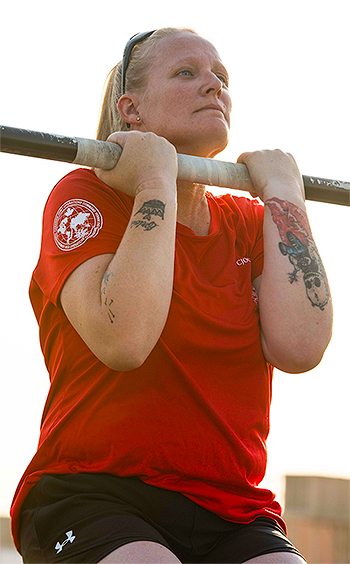Ask the Expert: Preventing a pandemic of health problems
November 16, 2020 - Defence Stories

Caption
Canadian Armed Forces members participate in the German Armed Forces Proficiency Badge (GAFPB) competition, a two-week event that tests competitors’ physical and mental fitness, in Camp Arifjan, during Operation IMPACT on September 20, 2020. (Credit: Sailor Third Class Melissa Gonzalez)
Q: As a result of COVID-19, my husband has spent the last seven months working from home and during that time he has definitely been less physically active. He no longer has access to a gym, noon hour fitness classes, team sports or partners to exercise with. I am concerned that his being less active will increase his risk of illness and injury in the future. Am I stressing for nothing? Worried Wendy
A: Dear Worried Wendy: Studies have showed the restrictions placed on Canadians during the COVID-19 pandemic have resulted in a significant reduction in our physical activity levels.
In some countries, workers report they are sitting 75 minutes more during their work day. Sitting is now recognized as a health risk factor and anything that increases the amount of time you spend sitting is undesirable. In addition to sitting more, Canadians who work from home are not benefitting from the exercise they used to get walking to and from work and walking at their place of work. While this may not sound like a big deal, this decrease in physical activity starts to add up and the following are some unwanted side effects:
- Over time, reduced physical activity can result in weight gain and this can have many unwanted consequences including increasing the risk of developing diabetes, high blood pressure and heart disease;
- We are designed to move and being inactive reduces the strength of our core, arm and legs muscles. These changes not only make it harder to do things such a mowing the lawn but they also increase the risk of musculoskeletal injuries such as rotator cuff tears;
- Even short periods of inactivity have been shown to make it challenging for some people to resume regular exercising – in essence, we can learn to be couch potatoes;
- Social isolation and physical inactivity are a bad combination when it comes to mental health. Research has shown that regular physical activity can play an important role in the treatment and prevention of mental health disorders such as depression, PTSD and anxiety;
- Your heart is a muscle and it depends on you being physically active to function efficiently; and
- The immune system functions better when you are physically active and during this pandemic this could potentially be a lifesaving benefit.
Staying active during this pandemic doesn"t need to be complicated. It could be as simple as walking, jogging or cycling for thirty minutes five times/week. Try taking the kids and your dog with you – they need the exercise just as much as you do. If you are having trouble finding the time to exercise, why not use the time you save not having to commute to and from work.
The bottom line: The COVID-19 pandemic has placed enormous stress on Canada"s health care system. The last thing we need right now is to increase this burden with a “pandemic” of health problems related to being less physically active. Stay active, stay safe and we will get through this.

Dr. Darrell Menard OMM MD, Dip Sport Med
Dr. Menard is the Surgeon General"s specialist advisor in sports medicine and has worked extensively with athletes from multiple sports. As part of the Strengthening the Forces team he works on injury prevention and promoting active living.
Strengthening the Forces is CAF/DND"s healthy lifestyles promotion program providing expert information, skills and tools for promoting and improving CAF members" health and well-being.